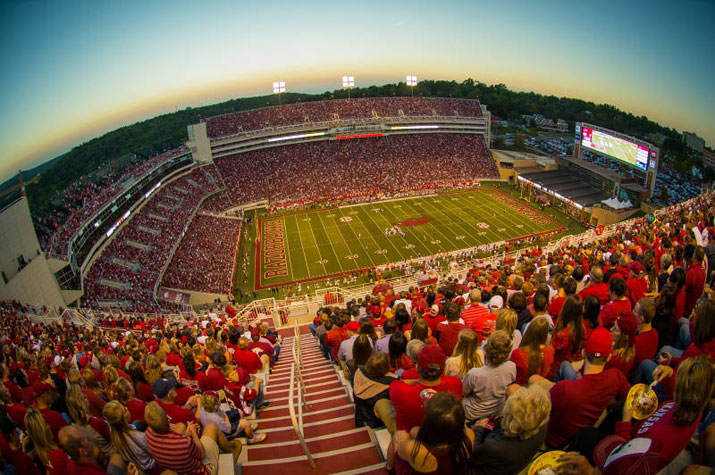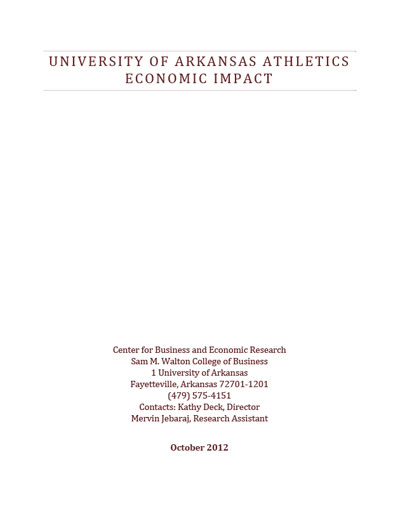
Photo: Walt Beazley, UA Athletics
Razorback Athletics are responsible for about $153.6 million in statewide annual economic activity, according to a study released Friday by the University of Arkansas Center for Business and Economic Research. That’s not counting another $239.7 million that could be generated if the department moves forward with a host of planned on-campus construction projects.
The study, conducted during the 2011-12 academic year, identified the UA’s Department of Intercollegiate Athletics and Razorback-related activities as one of the major economic catalysts in Arkansas.
Three broad categories of athletics-related activities that produce economic impact were analyzed in the study including department operations, visitor spending at home football, baseball and basketball games, and construction expenditures. Operations and visitor spending provide an annual economic impact while construction expenditures results in one-time economic impact.
“Our study illustrates the tremendous annual economic value of Razorback Athletics to the entire state,” said Kathy Deck, Director of the Center for Business and Economic Research in the Walton College. “The impact of a thriving nationally competitive intercollegiate athletics program that draws more than one million fans annually is vital to the economic stability of Arkansas. The region relies on the economic benefits created by fans that pack hotels, dine in restaurants and support local businesses. Razorback football in particular has been a driving force in bringing new hotels and other businesses to our area. They simply wouldn’t be here if they couldn’t count on the influx of visitors during the fall, year in and year out.
“In addition, the athletic department’s continued investments in the renovation and construction of facilities creates job opportunities and adds significant value to the overall economic outlook for Fayetteville and surrounding communities.”
The athletic department at the UA is one of just a handful of financially self-supporting programs in the country.
The study showed that in 2010-11, Razorback Athletics made expenditures of $84.7 million leading to an estimated economic impact of $124.1 million for the statewide economy. During that span, the department employed more than 260 people on a full-time basis and 982 people on a part-time or hourly basis.
Based on increased spending to support the program in 2011-12, Razorback Athletics generated an increased impact to the state and region, with an estimated economic impact of $129.7 million.
In the 2011-12 academic year, more than one million fans attended sporting events on the University of Arkansas campus resulting in 35,805 hotel or motel room nights and the purchase of over one million meals. Visitors to Razorback events generated new economic activity of nearly $30 million in Northwest Arkansas alone, netting a combined $2.66 million in state and local sales taxes directly benefitting the residents of Northwest Arkansas.
The study found that 66.8 percent of attendees at football games in Fayetteville were visitors from outside Northwest Arkansas. On average, each visitor spent $101.87 to benefit the local economy and generated an estimated $292,026 in state sales tax and $147,013 in local sales taxes. A total of 5,774 hotel rooms in Northwest Arkansas were occupied by football game attendees and 176,957 meals were consumed by visitors in area restaurants. In all, visitors to the area spent $4,900,437 in Northwest Arkansas during their stay. In addition, local residents engaged in significant economic activity related to game day. The Center for Business and Economic Research has recently stated that economic indicators showed an increase in visitor spending and sales tax revenues during the 2012 football season.
Razorback Athletics has also been a catalyst in job creation and construction activity in the region. From 2002-11, the athletic department generated a total of 3,342 jobs related to construction projects creating a direct economic impact of $288.7 million during that span. In 2012 alone, the new Football Center project provided 561 jobs and made an estimated impact of $64.5 million.
Based on projections of the next five years of athletic facility construction activity, worth $150 million in 2012, will lead to 2,016 jobs and estimated long-term economic value of $239.7 million.
The full 74-page study is available on ArkansasRazorbacks.com.


